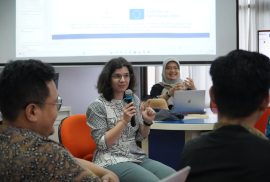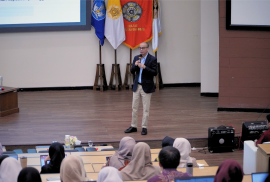In order to establish friendly ties between its members, the CFP MM UGM Alumni Community once again invited alumni to a webinar with speaker Edhi Tjahja Negara, Director of Wealth & Personal Banking at HSBC, who presented a very interesting topic, namely Preparing for Leadership in a New World in Permanent Crisis.
The event was opened with Prof. Dr. Eduardus Tandelilin, M.B.A., Director of MM FEB UGM Jakarta, who said that this webinar aimed to educate the public and it had been designated a free webinar because MM FEB UGM really wanted to give something to the community and hoped this activity would be able to provide great benefits to the webinar’s participants in particular. “The collaboration between MM FEB UGM and HSBC has been established for a long time in the form of training for employees of HSBC Bank and in the near future it will resume with a new class,” he said.
Arief Budiman, the CFP MM FEB UGM Coordinator, added that the MM FEB UGM CFP Program includes four pillars in the form of modules that are suited to the needs of the community. What distinguishes the MM FEB UGM CFP Program from others is that its instructors are a mix of experts who are both academics and practitioners, and no less important is the fact that, at the end of the session, the participants get an ‘Individual Assignment’ that directly develops their abilities.
The event continued with a presentation by speaker Edhi Tjahja Negara who said that HSBC is a global institution which is present in 64 countries and, as of 2019, had 40 million customers and 235,000 employees, including in Indonesia where HSBC operates in 25 cities and has 71 branches. HSBC was also named Best Wealth Manager Award for two consecutive years by the Asset Asian Awards and won the award for The Best Wealth Management Business from The Asian Banker in 2019. Therefore, HSBC continues to choose to work in partnership with MM FEB UGM so it can maintain its leading position.
Edhi went on to say that Indonesia could be grateful because it experienced a contraction of only 3% compared to other countries which experienced much deeper downturns. “The current situation is one which is full of challenges. Until a vaccine is found, we have to survive. We call this a permanent crisis,” he said.
“This crisis teaches us that culture is increasingly important,” he continued. According to Edhi, culture will devour a strategy; there is no point in having a strategy that is very extraordinary if the culture in an organization does not support it. Also, culture always talks about leadership and about people,” he added. “Why is culture increasingly important and not technology? It’s because technology will continue to develop in line with its progress, but cultural leadership is what we have to drive so that we merge from within,” he explained. In closing, Edhi explained that there were several things that must be the focused on besides culture, namely connectedness, adaptivity, productivity, creativity and consistency. (Public Relations; Dwi / Photo; Irvan).







